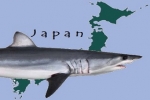An open letter concerning the unsustainability of shark finning
White Shark Conservation Trust 29. May 2012 As a conservation organisation, we would like to express our concern about the recent misinformation perpetuated in the national and international media asserting that the shark fin trade is sustainable. The reality is that this vast trade is largely unmanaged and unmonitored, and that the shark fin
Tuna processors put shark finning ban in writing
Media Release International Seafood Sustainability Foundation (ISSF) Companies that Prohibit Shark Finning Posted by Mike Crispino, 1 June 2012 This year we asked the tuna industry to take a step toward ending the practice of shark finning, the act of removing a shark’s fin while discarding the carcass at sea. It violates the Food and
Shark bite reported in Avon, North Carolina
Clinic: Shark attack confirmed in Avon Female tourist bitten By Jessica O. Swink, Friday, 01 Jun 2012 AVON, N.C. (WAVY) – A spokeswoman for the Avon Medical Clinic confirmed a shark attack in Avon around 1:30 p.m. Thursday. The clinic says the victim was a female tourist. National Park Service spokeswoman Cyndy Holda said
Japan’s Sharks and Rays tested on Radioactivity
The Effect of the Fukushima Nuclear Disaster on the Elasmobranch Fauna in Japan. Below are the latest results of the tests on levels of radioactive Caesium (Caesium-134 and Caesium-137) found in muscle tissue of elasmobranch species (sharks, skates and rays).
Regiospecific Analysis of Shark Liver Triacylglycerols
Published online on 24. May 2012 Regiospecific Analysis of Shark Liver Triacylglycerols Chamila Jayasinghe, Naohiro Gotoh und Shun Wada ABSTRACT: The liver oils of six shallow-water shark species, silky (Carcharhinus falciformis), thresher (Alopias superciliosus), oceanic whitetip (Carcharhinus longimanus), blue (Prionace glauca), hammerhead (Sphyrna lewini) and salmon (Lamna ditropis) were analyzed with particular attention to the




